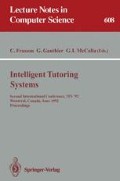Abstract
This paper discusses the design and evaluation of a hypertext-based environment that presents instructional material on programming in Lisp. The design of the environment was motivated by results from studies investigating students' strategies for knowledge acquisition. The effectiveness of the design was evaluated by conducting a study that contrasted how subjects used and learned from the instructional environment compared to subjects using more standard, structured, linear instruction. The results showed an interesting ability by environment interaction: the higher ability subjects using the hypertext environment improved and made significantly less errors when programming new concepts while the lower ability subjects did not improve and made more errors. Meanwhile, subjects using the control environment did not show this ability-based difference. These results have implications for the design of intelligent tutoring systems. They affect decisions involving the amount of learner control that is provided to students and the way student models are constructed.
Preview
Unable to display preview. Download preview PDF.
References
J.R. Anderson and B.J. Reiser. The LISP Tutor. Byte, 10:159–175, 1985.
S. Card, T. Moran, and A. Newell. The psychology of Human-computer interaction. Lawrence Erlbaurn, Associates, Hillsdale, NJ, 1983.
M.T.H. Chi, M. Bassok, M.W. Lewis, P. Reiman, and R. Glaser. Self-explanations: How students study and use examples in learning to solve problems. Cognitive Science, 13:145–182, 1989.
W. Doyle. Academic work. Review of Educational Research, 53(2):159–199, 1983.
J. Laird, P. Rosenbloom, and A. Newell. Soar: An architecture for general intelligence. Artificial Intelligence, 33:1–64, 1987.
T. Mayes, M. Kibby, and T. Anderson. Learning about learning from hypertext. In D. Jonassen and H. Mandl, editors, Designing Hypermedia for Learning, pages 227–250. Springer Verlag, Berlin, 1990.
J. Nielsen. Hypertext & Hypermedia. Academic Press, San Diego, CA, 1990.
S. Papert. Mindstorms: Children, Computers, and Powerful Ideas. Basic Books, New York, 1980.
P. Pirolli. A cognitive model and computer tutor for programming recursion. Human-Computer Interaction, 2:319–355, 1986.
P. Pirolli and J.R. Anderson. The role of learning from examples in the acquisition of recursive programming skills. Canadian Journal of Psychology, 39(2):240–272, 1985.
P. Pirolli and M. Recker. Knowledge construction and transfer using an intelligent tutoring system: The role of examples, self-explanation, practice, and reflection. Technical Report CSM-1, University of California, Berkeley, 1991.
M. Recker and P. Pirolli. Self-explanation verbal protocols: A protocol coding scheme and representative protocols. Technical Report CSM-5, University of California, Berkeley, 1991.
L. Reder, D. Charney, and K. Morgan. The role of elaborations in learning a skill from instructional text. Memory and Cognition, 14:64–78, 1986.
B. Reiser, W. Copen, M. Ranney, A. Hamid, and D. Kimberg. Cognitive and motivational consequences of tutoring and discovery learning. Technical report, Cognitive Science Laboratory, Princeton University, 1991.
B.H. Ross. Remindings and their effects in learning a cognitive skill. Cognitive Psychology, 16:371–416, 1984.
R. E. Snow and D. F. Lohman. Toward a theory of cognitive aptitude for learning from instruction. Journal of Educational Psychology, 76:347–376, 1984.
E. Steinberg. Cognition and learner control: A literature review, 1977–1988. Journal of Computer-Based Education, 16(4):117–121, 1989.
J. Sweller. Cognitive load during problem solving: Effects on learning. Cognitive Science, 12:257–285, 1988.
M. Twidale. Cognitive Agoraphobia and Dilettantism: Issues for Reactive Learning Environments. In L. Birbaum, editor, Proceedings of the International Conference of the Learning Sciences. Association for the Advancement of Computing in Education., Chariottesville, VA, 1991.
Author information
Authors and Affiliations
Editor information
Rights and permissions
Copyright information
© 1992 Springer-Verlag Berlin Heidelberg
About this paper
Cite this paper
Recker, M.M., Pirolli, P. (1992). Student strategies for learning programming from a computational environment. In: Frasson, C., Gauthier, G., McCalla, G.I. (eds) Intelligent Tutoring Systems. ITS 1992. Lecture Notes in Computer Science, vol 608. Springer, Berlin, Heidelberg. https://doi.org/10.1007/3-540-55606-0_46
Download citation
DOI: https://doi.org/10.1007/3-540-55606-0_46
Published:
Publisher Name: Springer, Berlin, Heidelberg
Print ISBN: 978-3-540-55606-0
Online ISBN: 978-3-540-47254-4
eBook Packages: Springer Book Archive

